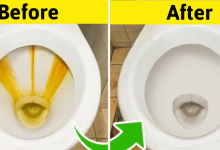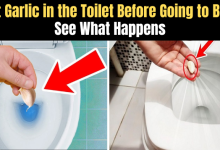To keep healthy and energized, we make an effort to exclusively buy ecologically friendly products, avoid synthetic fabrics, and replace our furniture with furniture made of wood or recycled materials. However, we sometimes neglect to read the labels on the detergents we buy on a regular basis to clean our homes.
Unfortunately, manufacturers frequently modify the product’s name but not its content, expecting that simply adding the term “eco” to the label will clean the globe.
We gathered a list of organic detergent alternatives that are completely safe for both humans and the environment.
Raw potato

Potato isn’t only an excellent ingredient for cooking delights. You can quickly clean your kitchen using a raw potato. Moreover, it will help you remove dust from your favorite paintings!
Potato can replace window and tile cleaners.
How to use it:
- To clean paintings, grate 0.5 kg (1 lb) of raw potatoes, fill a pot with four liters of water, heat it, stir, and put the pot in a warm place for 24 hours. The next day, wipe paintings with this mixture. It’s important to rinse the sponge in clean water frequently and wring it well.
- Just rub windows and tiles in the bathroom with a slice of raw potato, and then wipe the surfaces with a clean and dry cloth.
Salt

This is the cheapest “cleaning product,” and it can be found in any kitchen. You can use salt in plenty of ways in your daily life.
It can be a cleaner for your kitchen, bath, sanitary ware, and even as a stain remover.
How to use it:
- To clean and disinfect kitchen sponges and washcloths, put them in a bowl with salt water.
- To get rid of unpleasant smells, apply salt diluted in carbonated water on the door and inner parts of the fridge before defrosting or washing it.
- To clean a wool bedside rug, strew it with salt, sprinkle with water, wait for half an hour, and then vacuum it.
Baking soda and mustard

These won’t hurt your wallet at all. Baking soda has abrasive properties, and mustard is an oil-repellent.
You can use these instead of dishwashing detergents and cleaners for the oven, sanitary ware, and kitchen worktops.
How to use it:
- 1 teaspoon of mustard powder with a few liters of hot water is all you need to shine even the oiliest pans.
- Sprinkle a thin layer of baking soda on a dirty carpet, gently rub it with a brush, and then vacuum it.
Lemon

Lemon is an excellent disinfectant that can remove oil, dirt, and soap scum from tiles. Moreover, it protects surfaces against mold growth, and it’s also a natural air freshener.
It’s a great substitute for all kitchen and bathroom detergents.
How to use it:
- Wipe the fish or meat cutting board with lemon to disinfect it and get rid of unpleasant odors.
- Pour 3 tablespoons of lemon juice in 400 ml of water and put it in the microwave for ten minutes on high. It will completely clean the microwave from the inside.
- You can easily remove limescale from the tap with lemon juice.
Vinegar

This is a universal cleaner to keep your home clean and fresh. Vinegar is an excellent remover of calcium stains and stale patches. In order to avoid the strong vinegar smell, just add a drop of lavender essential oil in it.
Vinegar can be a substitute for all cleaners for mirrors, windows, sanitary ware, tiles, and floors.
How to use it:
- Add 1 teaspoon of vinegar to a liter of water, pour the mixture into a spray bottle, and wash the windows and mirrors with it.
- Apply vinegar on tiles in the bathroom, wait for 10 minutes, and wash it away with clean water.
- To remove the old limescale from your sink, place a rag soaked in hot vinegar on top of the dirty area. After half an hour, you can easily remove the limescale with a brush and ordinary soap.
- Add 2 tablespoons of vinegar to a liter of water to remove white stains from the floor after home repair.
Coca-Cola or Pepsi

These can easily remove even serious dirt, as well as lime and soap stains.
It’s a great cleaner for almost everything: showers, baths, taps, sanitary ware, tiles, burnt dishes, and ovens.
How to use it:
- Boil Coca-Cola or Pepsi in a pan with a burnt bottom to make it look like a new one.
- It removes rust and corrosion from any home items.
- Pour Coca-Cola or Pepsi into the drain pipe and leave it overnight to clean it from hair and dirt.
Vitamin C

These effervescent tablets perfectly clean dirty sanitary ware without any effort from your side.
This is a substitute for sanitary ware cleaners.
How to use it:
To clean a toilet bowl from lime deposits under the waterline, throw a few effervescent tablets of vitamin C there and leave them in overnight. The next morning, you can remove the plaque with a cleaning brush and flush the toilet.
Olive oil

This is the best cleaner for even the most expensive furniture. In addition, it’s very cost-effective – you only need a couple of drops for cleaning. Olive oil also refreshes and polishes wooden surfaces.
This is a great substitute for polish and wood surface cleaners.
How to use it:
Place a couple of drops on cotton fabric to refresh and polish wood or leather furniture and parquet.
To protect wicker furniture against cracking, wipe it with olive oil from time to time.
Essential oils

Oils are the best air fresheners and excellent disinfectors. Using them, you can turn the cleaning process into aromatherapy. Oils can prevent mold and mildew growth on walls.
You can use them as an air freshener, disinfectant, wood floor cleaner, and anti-mildew cleaner.
How to use it:
- Wipe all the surfaces where bacteria can accumulate with lavender oil or tea tree oil – kitchen worktops, cutting boards, and sanitary ware.
- Add 30 drops to 5 liters of water to wash floors.
- A mixture of undiluted lemon, melissa, fir wood, juniper, thyme, mint, lavender, and fir oils dissolves a greasy spot on the fabric within 3-5 minutes.
Toothpaste

Toothpaste is always within reach. It cleans almost every surface without any effort because it’s an excellent stain remover.
This is a good substitute for abrasives, tile, and sanitary ware cleaners or stain removers.
How to use it:
- A little toothpaste can clean even the oldest silverware.
- Toothpaste is able to remove ink, makeup, butter, coffee, or tea stains on carpets. Put a bead toothpaste on the stain, leave it for a few minutes, and then wash it off.
- To remove cup stains from wooden furniture, wipe them with a soft cloth along with a bit of toothpaste.
- It easily removes traces of markers and pens from painted walls.
Hydrogen peroxide

Hydrogen peroxide disinfects any surface. It can safely be used for cleaning even the baby’s room.
This is a natural substitute for bathroom and kitchen cleaners and whiteners.
How to use it:
- It has antibacterial properties, so use it to clean work surfaces, cutting boards, and different containers for food in the kitchen.
- Mix hydrogen peroxide with lemon juice to make a natural alternative for fabric whiteners.
- If you put white dishes in a bowl with warm water and 2 tablespoons of hydrogen peroxide for ten minutes, the plates and cups will become snowy white.
Activated charcoal tablets

These can absorb even the most unpleasant smells. This is the easiest way to trap odors from the refrigerator and trash bins.
Activated charcoal tablets are a great substitute for commercial odor traps and air fresheners.
How to use it:
Put crushed charcoal tablets in the refrigerator for a few hours to eliminate unpleasant smells.
Talcum powder

This simple product is absolutely harmless even for infants.
Using talcum powder, you can clean stains from fabrics and floors.
How to use it:
- Sprinkle a fresh greasy spot on the carpet or fabric with talcum powder, cover it with a clean piece of paper, and put something heavy on top. The next day, clean the spot and beat it out.
- Use it to clean any fresh stains from the linoleum.







